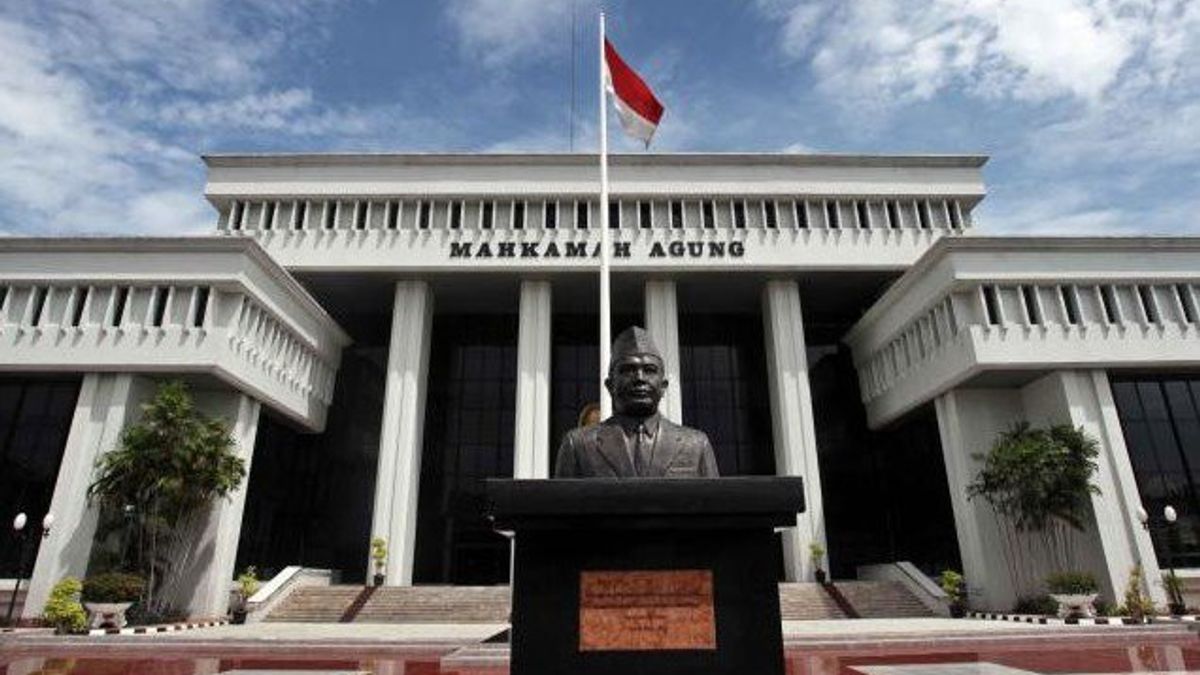JAKARTA - The Supreme Court (MA) is in the spotlight for circumcising the criminal sentence imposed on the former Secretary General of the Golkar Party, Idrus Marham, who was caught in the bribery case of the Riau-1 PLTU project. This then led to various speculations, including the weakening of the Supreme Court in the presence of corruptors after the retirement of Supreme Court Justice Artidjo Alkostar.
Idrus, who in the PLTU Riau-1 case was deemed to have helped former DPR member Eni Maulani Saragih get bribes from businessman Johanes Budisutrisno Kotjo, his sentence was cut from five years in prison to two years in prison.
Seen on the website of the Supreme Court, Chief Justice Suhadi with members Krisna Harahap and Prof. Abdul Latief agreed to reduce Idrus's sentence because Idrus was not the determinant of the project being lobbied by Eny Saragih and Johanes.
The criminal law expert at Trisakti University, Abdul Fickar Hadjar, responded to this punitive circumcision. He assessed that there is an increasing trend of sentence cuts after the Supreme Court was left by Artidjo Alkostar, who became the scourge of corruptors.
"After Supreme Court Justice Artidjo retires, it seems that no one else has the 'moral strength' to guard and restrain the corrupt libido of judges at the Supreme Court," said Fickar to reporters in Jakarta, Friday, December 6.
Fickar revealed several examples such as the acquittal of the defendant in the corruption case, the issuance of a Certificate of Settlement for Bank Indonesia Liquidity Assistance (SKL BLBI), Syafruddin Arsyad Tumenggung. According to him, there were ethical violations that occurred before Syafruddin was acquitted by the Supreme Court, namely the meeting between the MA Adhoc Judge Syamsul Rakan Chaniago and Syafruddin 's attorney.
Apart from that, there was also Idrus Marham who was circumcised and sentenced to two years imprisonment and there are also other cases which in fact have gone unnoticed, according to Fickar. "The Supreme Court recently decided to release the accused of corruption several times. Then yesterday, the Supreme Court just released Fredrick Siahaan in the case of the PT Pertamina BMG Block," he said.
Whereas in deciding a case, said Fickar, Supreme Court Justices are limited by three norms that must be upheld. The first is about legal certainty or being limited by law. He gave an example in cutting Idrus Marham's sentence. In his verdict at the Corruption Court, Idrus was only sentenced to three years.
Then on appeal, the Golkar Party politician's sentence was increased to five years. From the additional sentence period, Fickar said that Idrus was proven to have committed an act detrimental to the state and the Supreme Court actually denied it by commuting his sentence during the appeal process.
The second norm is a decision that is contextual, or contains a sense of justice that develops in society. The Supreme Court Justice, according to Fickar, needs to consider the public's response to corruptors. This cannot be seen, because Idrus, who was found guilty, had his sentence commuted.
Third, is to consider the freedom of Supreme Court Justices in deciding cases. Is this freedom used for his own benefit or to benefit society.
Fickar emphasized that the judge's interest should be in a sense of justice, unless they accept bribes. "So the use of freedom is an option that should fulfill these three interests at once," he stressed.
In the future, he hopes that the judges' supervisory committee such as the Judicial Commission or the Supreme Court Supervisory Board can carry out its duties properly. Because, this sentence circumcision could be a bad precedent if it continues. "Supervision measures have been tightened and the law is strictly enforced," said Fickar.
Apart from Idrus and Syafruddin, the MA has indeed recently performed circumcision sentences in 2019. As for those who have their prison terms cut, are:

1. Helpandi
The Supreme Court recently decided to circumcise the sentence of the defendant in the judge's bribery case. In case number 3784 K / PID.SUS / 2019, the panel reduced Helpandi's sentence to six years.
Initially, in April 2019, the Corruption Court sentenced Helpandi to seven years in prison. The decision was later upheld by the DKI high court. However, after the Supreme Court granted the cassation, the sentence for the Medan District Court Substitute Clerk was reduced from seven years to six years.
2. M Sanusi
The Supreme Court circumcised the sentence for the former member of the DKI Jakarta DPRD in early November 2019. Sanusi was involved in corruption in the Jakarta Beach reclamation permit. Initially, he was sentenced to seven years in prison at the Jakarta Corruption Court. KPK prosecutors filed an appeal and the high court increased Sanusi's sentence to 10 years.
Not receiving it, Sanusi also carried out a review process, the result was that the Supreme Court then circumcised Sanusi's sentence from 10 years to seven years in prison.
3. Tarmizi
At the end of October 2019, the Supreme Court cut the sentence of the substitute clerk of the South Jakarta District Court. Initially, Tarmizi was sentenced to four years in prison for accepting a bribe in connection with this civil case.
The sentence was handed down by the Jakarta Corruption Court in March 2018. Initially he accepted, then, he tried to file a judicial review. As a result, the Supreme Court reduced Tarmizi's sentence to three years.
4. Irman Gusman
The former chairman of the DPD also enjoyed the reduced sentence at the end of September 2019. It is known, in February 2017, Irman was sentenced to 4.5 years in prison at the Tipikor court because he was proven to have accepted bribes and regulated the provision of imported sugar quotas.
Not accepting, Irman then submitted a PK at the end of 2018. The Supreme Court granted the submission and Irman's sentence was cut from 4.5 years to 3 years.
5. Patrialis Akbar
The former Justice of the Constitutional Court enjoyed a sentence cut by the Supreme Court at the end of August 2019. The sentence for the recipient of the Judicial Review bribe was circumcised at the level of reconsideration.
Patrialis was sentenced to eight years in prison at the Topicor Court, after the filing, the Supreme Court cut his sentence to seven years in prison.
6. Tamin Sukardi
At the end of May 2019, the sentence of the former President Director of PT Erni Putra Terari was circumcised by the Supreme Court. This commutation is carried out at the cassation level.
The defendant who bribed the judge at the Medan District Court was sentenced to 5 years in prison by the Supreme Court. Even though in early April 2019, the Jakarta Corruption Court sentenced Tamin to 6 years in prison.
He also filed an appeal, and the result was that the Medan High Court increased Tamin's sentence to 8 years in prison. However, at the cassation level, the Supreme Court even circumcised the businessman's sentence to 5 years imprisonment.
7. Choel Mallarangeng
Andi Zulkarnaen Mallarangeng alias Choel Mallarangeng enjoyed a reduced sentence on March 19, 2019. Previously, he was sentenced to 3.5 years.
However, the verdict which was decided by the Corruption Court on July 6, 2017, had to run aground at the reconsideration level. The corruptor of the Hambalang athlete homestead project only served a 3-year sentence.
The English, Chinese, Japanese, Arabic, and French versions are automatically generated by the AI. So there may still be inaccuracies in translating, please always see Indonesian as our main language. (system supported by DigitalSiber.id)













